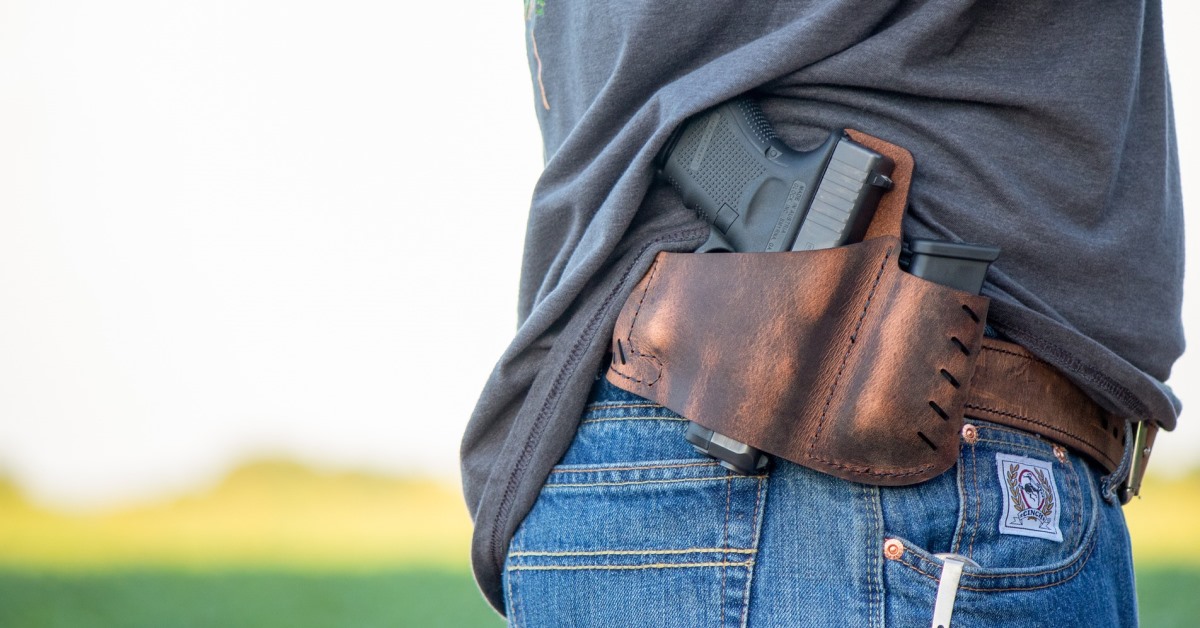
In 2021, the Texas Legislature passed and Governor Greg Abbott signed into law House Bill 1927 (the “Firearm Carry Act of 2021”). The Act, which went into effect on September 1, 2021, permits individuals who are twenty-one years of age or older to carry a holstered handgun in Texas in public without a government-issued permit or license.1 The Act eliminated the requirement that individuals who are twenty-one years of age or older must obtain a license to carry (LTC) in order to carry a handgun. (Although this requirement was eliminated, individuals can still apply for an LTC, which has its own set of benefits.) Individuals who are prohibited from possessing firearms under state and federal law are still subject to the same restrictions and are not authorized by the Act to lawfully carry and possess a firearm.
Prohibitions on Where Firearms May Be Carried in Texas
The Act still prohibits the carrying of a handgun (and other firearms or weapons) in certain locations, including schools, amateur or professional sporting events, prisons, civil commitment facilities, state-run hospitals and nursing facilities, amusement parks, and businesses that derive 51% or more of their income from the sale or service of alcohol for on-premises consumption. In addition, employers still have the right to determine whether the carrying of handguns (or any other firearms or weapons) onto the employer’s premises by members of the public or employees is permitted. An employer that wants to prevent the carrying of handguns or any other firearms onto its premises should post notices with specific language prohibiting such conduct at various points of entry (e.g., entrances to buildings). The specific language that employers can use for such notices can be found in Sections 30.05, 30.06, and 30.07 of the Texas Penal Code. Individuals who carry a firearm onto an employer’s premises after they have received written or oral notice that entry with a firearm is prohibited can be charged with a Class C misdemeanor.
Firearms and the Employer’s Premises
The Act did not alter Section 52.062(b) of the Texas Labor Code, which permits employers to prohibit their employees from possessing a firearm on the employer’s “premises.” An employer’s premises means “a building or portion of a building” that does not include “any public or private driveway, street, sidewalk or walkway, parking lot, parking garage, or other parking area.” However, the Act still bans employers from prohibiting employees from transporting or storing firearms or ammunition in their locked private vehicles in a parking lot, parking garage, or other parking area the employer provides for employees. The Act also did not affect an employer’s immunity from civil liability for injuries or deaths that arise out of an occurrence involving a firearm or ammunition that the employer is required to keep on its property. Moreover, the Act retains the presumption that the presence of a firearm on the employer’s premises does not itself constitute the failure by the employer to provide a safe workplace.
Employers Who Prohibit the Carrying of Firearms
Employers that want to prohibit employees from carrying firearms on the employer’s premises should provide written (not just oral) notice of the employer’s policy to its employees. This can be done by posting at points of entry notices that contain the specific language defined in the statute prohibiting the carrying of firearms and by providing a written policy to that effect in the employee handbook.
Employers Who Permit the Carrying of Firearms
Employers that want to permit the carrying of firearms by employees on the employers’ premises need to clearly define the parameters of such conduct. Some considerations include:
- who may carry firearms (e.g., those who are licensed versus those who are unlicensed to carry handguns),
- where the firearms may be carried during the scope of employment (e.g., while operating company vehicles or traveling on duty),
- where the firearms may be kept while on the employer’s premises (e.g., secured in a desk or locker), and
- how and under what circumstances an employee’s firearm privilege can be revoked (e.g., when the employer has reasonable cause to believe revoking a firearm privilege is necessary to keep the workplace safe).
With the recent one-year anniversary of the Firearm Carry Act of 2021, the impact of the legislation on the workplace for employers and employees alike continues to evolve. As a result, employers would be wise to adopt policies and procedures that govern the carrying of firearms by employees on the employer’s premises—regardless of whether the employer permits or prohibits such conduct.
- Since the Firearm Carry Act of 2021 was enacted, a federal judge ruled in Firearms Policy Coal., Inc. v. McCraw, No. 21-CV-1245, 2022 U.S. Dist. LEXIS 152834, 2022 WL3656996 (N.D. Tex. Aug. 31, 2022) that Texas’ statutory scheme prohibiting law-abiding individuals who are eighteen to twenty years of age from carrying handguns for self-defense outside their homes based solely on their age violated the Second Amendment of the U.S. Constitution. The State of Texas filed a notice of appeal to the Fifth U.S. Circuit Court of Appeals on September 21, 2022, but subsequently withdrew its appeal. As a result, law-abiding individuals who are eighteen to twenty years of age are not prohibited from applying for a license to carry a handgun in Texas.

